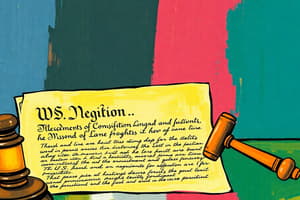Podcast
Questions and Answers
What does Amendment 1 guarantee?
What does Amendment 1 guarantee?
- Freedom of speech, press, religion, assembly, and petition (correct)
- Right to bear arms
- No unreasonable search or arrest
- Abolish slavery
What right is protected by Amendment 2?
What right is protected by Amendment 2?
Right to bear arms
What does Amendment 3 state about housing soldiers?
What does Amendment 3 state about housing soldiers?
Citizens do not have to house soldiers
What type of search does Amendment 4 prohibit?
What type of search does Amendment 4 prohibit?
What does Amendment 5 protect you from?
What does Amendment 5 protect you from?
What right is guaranteed by Amendment 6?
What right is guaranteed by Amendment 6?
What is the monetary threshold for a jury trial in civil matters according to Amendment 7?
What is the monetary threshold for a jury trial in civil matters according to Amendment 7?
What does Amendment 8 prevent?
What does Amendment 8 prevent?
What rights does Amendment 9 refer to?
What rights does Amendment 9 refer to?
What does Amendment 10 specify?
What does Amendment 10 specify?
What does Amendment 11 state about suing a state?
What does Amendment 11 state about suing a state?
What change does Amendment 12 bring regarding presidential elections?
What change does Amendment 12 bring regarding presidential elections?
Which institution does Amendment 13 abolish?
Which institution does Amendment 13 abolish?
According to Amendment 14, who is considered a citizen of the U.S.?
According to Amendment 14, who is considered a citizen of the U.S.?
What does Amendment 15 prohibit?
What does Amendment 15 prohibit?
What type of tax is addressed by Amendment 16?
What type of tax is addressed by Amendment 16?
What system does Amendment 17 establish for U.S. Senators?
What system does Amendment 17 establish for U.S. Senators?
What does Amendment 18 enact?
What does Amendment 18 enact?
What right does Amendment 19 grant?
What right does Amendment 19 grant?
When does the President take office according to Amendment 20?
When does the President take office according to Amendment 20?
What does Amendment 21 do?
What does Amendment 21 do?
What limitation does Amendment 22 impose on the presidency?
What limitation does Amendment 22 impose on the presidency?
Who can vote for President according to Amendment 23?
Who can vote for President according to Amendment 23?
What does Amendment 24 prohibit?
What does Amendment 24 prohibit?
What situation does Amendment 25 address?
What situation does Amendment 25 address?
What voting age does Amendment 26 establish?
What voting age does Amendment 26 establish?
What does Amendment 27 state about congressional pay raises?
What does Amendment 27 state about congressional pay raises?
Study Notes
First Ten Amendments (Bill of Rights)
- Amendment 1: Protects freedoms of speech, press, religion, assembly, and the right to petition the government.
- Amendment 2: Affirms the right of individuals to keep and bear arms.
- Amendment 3: Prohibits the forced quartering of soldiers in private homes during peacetime.
- Amendment 4: Guards against unreasonable searches and seizures without probable cause.
- Amendment 5: Protects individuals from double jeopardy, self-incrimination, and mandates due process.
- Amendment 6: Guarantees the right to a speedy and public trial by an impartial jury in criminal cases.
- Amendment 7: Ensures the right to a jury trial in civil cases involving more than $20.
- Amendment 8: Prohibits excessive bail, fines, and cruel and unusual punishment.
- Amendment 9: Asserts that the enumeration of rights in the Constitution does not deny other rights retained by the people.
- Amendment 10: States that powers not delegated to the federal government are reserved for the states or the people.
Subsequent Amendments
- Amendment 11: Limits the ability of individuals to sue states in federal court.
- Amendment 12: Establishes the procedure for electing the President and Vice President with separate ballots.
- Amendment 13: Abolishes slavery and involuntary servitude, except as punishment for a crime.
- Amendment 14: Grants citizenship to all persons born or naturalized in the U.S. and guarantees equal protection under the law.
- Amendment 15: Prohibits denying the right to vote based on race, color, or previous condition of servitude.
- Amendment 16: Authorizes the federal government to impose and collect income tax.
- Amendment 17: Introduces the direct election of U.S. Senators by popular vote.
- Amendment 18: Enacts prohibition, making the production, sale, and transportation of alcohol illegal.
- Amendment 19: Grants women the right to vote.
- Amendment 20: Changes the date for the presidential inauguration to January 20th and updates congressional session start dates.
Final Amendments
- Amendment 21: Repeals the 18th Amendment, effectively ending prohibition.
- Amendment 22: Limits the President to two elected terms in office.
- Amendment 23: Allows residents of Washington D.C. to vote in presidential elections.
- Amendment 24: Prohibits poll taxes in federal elections.
- Amendment 25: Defines the succession process for the presidency, including procedures for filling presidential vacancies.
- Amendment 26: Lowers the voting age to 18 years.
- Amendment 27: Prevents members of Congress from receiving a pay raise until after the next election.
Studying That Suits You
Use AI to generate personalized quizzes and flashcards to suit your learning preferences.
Description
This quiz consists of flashcards covering the 27 amendments of the U.S. Constitution. Each card presents an amendment along with a clear and concise definition, making it easy to understand the rights and freedoms protected. Perfect for students studying American history or government.




